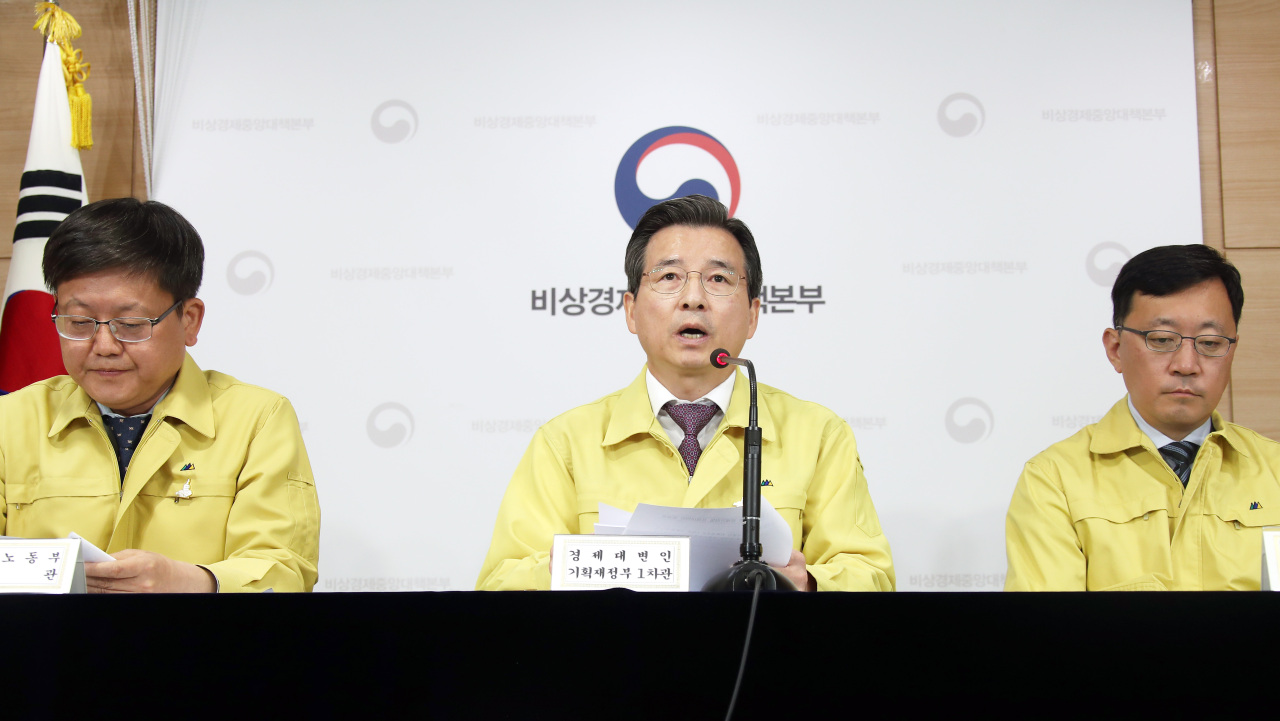 |
Vice Finance Minister Kim Yong-beom (center), Vice Labor Minister Lim Seo-jeong (left) and Vice ICT Minister Kim Jung-won (right) jointly hold a press briefing on the government’s emergency economic countermeasures on Thursday at Seoul Government Complex. (Yonhap) |
South Korea will provide 1.5 trillion won ($1.2 billion) in special subsidies to irregular workers who lost their income or suffered crucial blows amid the COVID-19 quarantines, the finance minister said Thursday.
The move came in line with the government’s struggles to sustain the nation’s job market amid an economy that is set to contract this year.
“Seeking to enhance the employment safety net for neglected underprivileged workers, (the government) will execute a 1.5 trillion-won employment stability fund,” Deputy Prime Minister and Finance Minister Hong Nam-ki said in an emergency economic policy meeting at Government Complex-Seoul.
Addressing the fiscal revenue required for the payment, Hong explained that the government last week approved the execution of reserve funds worth 940 billion won and is planning to include the remaining amount in the forthcoming third extra budget bill.
The detailed actions include the temporary payment of a monthly amount of 500,000 won to some 930,000 people over a three-month period.
The special employment subsidies will focus on freelance or temporary workers who either lost their jobs or were forced to take unpaid leave in the course of the epidemic spread, as well as small-sized businesses which have received heavy sales blows.
Those who have seen their sales or income fall 25 percent or more -- within the ceiling of 50 million won in annual income or 150 million won in annual sales -- will qualify for the fiscal support.
According to the guidelines of the Ministry of Employment and Labor, the professions eligible for the subsidy include after-school tutors, part-time lecturers, sport trainers, golf course caddies, theater and movie workers, couriers, and door-to-door salespeople.
The range of small-sized owner operators refers to the legal definition -- businesses with less than 10 employees in the case of mining, manufacturing and construction and those with less than five in the case of other sectors. The adult entertainment and gambling industries are to be excluded.
Reflecting the government’s earlier vow to exert all efforts to support the aviation and traveling businesses, those affiliated with manpower supplier firms in the aircraft handling or hotel sectors qualify for the subsidy application, even if their companies surpass the designated size.
The employment allowance will be paid regardless of the government’s emergency disaster relief fund. But for those who have already received job-related subsidies, the corresponding amount will be deducted from the total amount of 1.5 million won.
The government will open a dedicated website by May 25 to deal with the applications, which will be run from June 1 to July 20, according to Lim Seo-jeong, vice minister of employment and labor.
Considering the exploding demand in the early stage, the ministry may temporarily adopt a two-shift or five-shift system -- similar to the public ration system for the highly demanded face masks, which allowed people to purchase two masks per day on the designated day of the week, depending on the last digit of their birth year.
Asia’s fourth-largest economy shrank 1.4 percent on-quarter during the first three months of this year, marking the steepest quarterly fall since the global financial crisis.
Also, the International Monetary Fund forecast that the country’s growth rate for 2020 will dip to minus 1.2 percent, turning negative for the first time in 22 years. The anticipated figure, however, was the highest among member states of the Organization for Economic Cooperation and Development as the rest of the world continues to reel under the pandemic fallout.
By Bae Hyun-jung (
tellme@heraldcorp.com)




![[Herald Interview] 'Trump will use tariffs as first line of defense for American manufacturing'](http://res.heraldm.com/phpwas/restmb_idxmake.php?idx=644&simg=/content/image/2024/11/26/20241126050017_0.jpg)


![[Health and care] Getting cancer young: Why cancer isn’t just an older person’s battle](http://res.heraldm.com/phpwas/restmb_idxmake.php?idx=644&simg=/content/image/2024/11/26/20241126050043_0.jpg)
